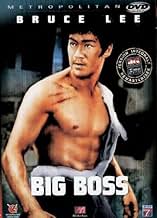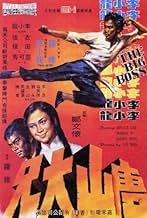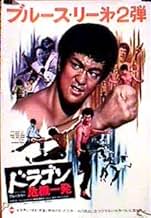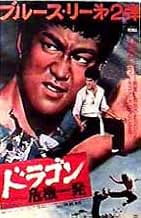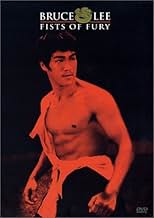AVALIAÇÃO DA IMDb
6,9/10
31 mil
SUA AVALIAÇÃO
Um jovem sob juramento de não cometer atos de violência trabalha com seus primos em uma fábrica de gelo onde eles começam misteriosamente a desaparecer.Um jovem sob juramento de não cometer atos de violência trabalha com seus primos em uma fábrica de gelo onde eles começam misteriosamente a desaparecer.Um jovem sob juramento de não cometer atos de violência trabalha com seus primos em uma fábrica de gelo onde eles começam misteriosamente a desaparecer.
- Direção
- Roteirista
- Artistas
James Tien
- Hsiu Chien
- (as Paul Tien)
Nora Miao
- Drinkstand owner
- (as Miao Ke Hsiu)
Ying-Chieh Han
- Hsiao Mi (Boss Mi)
- (as Han Ying Chieh)
Hua-Sze Li
- Ah Chai
- (as Li Hua Sze)
Marilyn Bautista
- Miss Wuman
- (as Malalene)
Billy Chan
- Ah Pei
- (as Hui-yi Chen)
Chia-Chen Tu
- Third Uncle
- (as Ka-ching To)
Avaliações em destaque
Cheng Chao-an (Bruce Lee) leaves his Chinese village to join relatives in Thailand. He is greeted by cousin Hsiu Chien who readily fights for others while Cheng promised his mother never to fight again. He joins his relatives at an ice factory owned by drug-lord big boss Hsiao Mi. When two of his cousins find drugs hidden in the ice, they are offered money but they politely refuse. They are killed and their bodies chopped up. Hsu Chien and Ah Pei go to ask questions but then they disappear. The men riot and Cheng is made foreman to appease them. Chiao Mei berates them for forgetting her brother. The boss throws him a party to get him drunk. Chiao Mei runs into him sneaking out of the brothel and the men are not happy that he forgot about Hsu Chien once again. Eventually, the hooker Sun reveals the truth and is killed. The boss's henchmen attack Chiao Mei and the family while Cheng is breaking into the factory. He finds drugs and the hidden bodies. He's confronted by the boss's son and numerous henchmen.
It's a functional kung fu story. The idea that he promised not to fight is great one. It allows him to be on another level when he actually does fight. It also allows him to be human. He gets tricked by the boss. He falls for a hooker. He's restrained by his promise. That makes the fights so much better. It's like he had saved all of his energy for his big fights. The movie is also more brutal and bloodier than I expected. The main thing is that this is a Bruce Lee movie and he shows that he's obviously a superstar. He's burning with charisma and it comes across on the screen.
It's a functional kung fu story. The idea that he promised not to fight is great one. It allows him to be on another level when he actually does fight. It also allows him to be human. He gets tricked by the boss. He falls for a hooker. He's restrained by his promise. That makes the fights so much better. It's like he had saved all of his energy for his big fights. The movie is also more brutal and bloodier than I expected. The main thing is that this is a Bruce Lee movie and he shows that he's obviously a superstar. He's burning with charisma and it comes across on the screen.
After trying to make a name in Hollywood with the TV series "Green Hornet" with mixed results, young actor and martial artist Bruce Lee traveled back to Hong Kong where his popularity as Kato was very high, there met Raymond Chow and received the chance to star a film about martial arts. "Tang Shan Da Xiong", or "The Big Boss" (known in the U.S. as "Fists of Fury"), was the final result and the movie that started Lee's career and his way to becoming a legend of celluloid.
"The Big Boss" is about a young Chinese man named Cheng Chao-an (Bruce Lee) who travels to Thailand looking for a job. Living with his distant cousins, he finds a job in the ice factory where his cousins work and soon he finds a family in them, developing a close friendship with Hsiu Chien (James Tien) and a big affection for Chow Mei (Maria Yi). Although he is a skilled fighter Cheng sworn an Oath of non-violence to his mother, promising that he would not be a get in fights. However, things get complicated when two of his cousins disappear and is discovered that the ice factory has a dark secret. Cheng will have to break his Oath in order to unveil the mystery behind the disappearance of his new family.
Directed by Wei Lo (who would also discover Jackie Chan), "The Big Boss" was a breath of fresh air to martial arts films as it showed a flawed hero in a modern setting. The story (by Wei Lo and Bruce Lee) is very well developed and filled with suspense and action, and in a bold move for an action film, the main character remains almost inactive for the first half as Cheng must avoid violence due to his oath. The film not only launched Lee's career to stratosphere, it influenced his own film-making's style and the way future martial arts movies were done.
Wei Lo's usually restrained style was also influenced by his young actor's abilities, "The Big Boss" can be seen as his transition to a more explosive way of film-making that would be completed in his next Lee's film ("Fist of Fury") and the subsequent Jackie Chan's films. The natural and raw look of the film added to the high dose of graphic violence (it is probably the goriest film in Lee's career) give the movie a harsh, gritty realism that adds to its charm.
As many have already said (and will continue saying without a doubt), Lee was a very charming actor whose presence filled the screen and owned it completely. That statement is proved here as we see him not as a killing machine, but as a common man who just wants to live peacefully, giving us many scenes of Cheng enjoying his new found family and struggling with his own vices. Lee's performance is very natural although one could say that he was basically playing himself. The rest of the cast ranges from average to OK, with James Tien, Quin Lee and Malalene being the best among them. However, it's fair to notice that the poor dubbing, typical of movies of the era makes a bit difficult to judge them fairly.
"The Big Boss" is considered among the weakest of Lee's films and not without a reason. Those accustomed to constant action scenes will feel it is slow due to the film's pacing and the way the story is built. The acting, as written above, is not very good and only Lee and Tien's performances are of constantly quality. And finally, Wei Lo's inclusion of some silly comedic effects feels terribly out of pace in an otherwise dark and gritty action film.
To summarize, "Tang Shan Da Xiong", or "The Big Boss", is a terrific film on its own right, and together with "Fist of Fury" ("The Chinese Connection") and "Enter the Dragon", a basic film to understand Lee's career and the development of martial arts films during the 70s. It may not be a classic as the films mentioned, but this was just the beginning of the legendary Bruce Lee. 7/10
"The Big Boss" is about a young Chinese man named Cheng Chao-an (Bruce Lee) who travels to Thailand looking for a job. Living with his distant cousins, he finds a job in the ice factory where his cousins work and soon he finds a family in them, developing a close friendship with Hsiu Chien (James Tien) and a big affection for Chow Mei (Maria Yi). Although he is a skilled fighter Cheng sworn an Oath of non-violence to his mother, promising that he would not be a get in fights. However, things get complicated when two of his cousins disappear and is discovered that the ice factory has a dark secret. Cheng will have to break his Oath in order to unveil the mystery behind the disappearance of his new family.
Directed by Wei Lo (who would also discover Jackie Chan), "The Big Boss" was a breath of fresh air to martial arts films as it showed a flawed hero in a modern setting. The story (by Wei Lo and Bruce Lee) is very well developed and filled with suspense and action, and in a bold move for an action film, the main character remains almost inactive for the first half as Cheng must avoid violence due to his oath. The film not only launched Lee's career to stratosphere, it influenced his own film-making's style and the way future martial arts movies were done.
Wei Lo's usually restrained style was also influenced by his young actor's abilities, "The Big Boss" can be seen as his transition to a more explosive way of film-making that would be completed in his next Lee's film ("Fist of Fury") and the subsequent Jackie Chan's films. The natural and raw look of the film added to the high dose of graphic violence (it is probably the goriest film in Lee's career) give the movie a harsh, gritty realism that adds to its charm.
As many have already said (and will continue saying without a doubt), Lee was a very charming actor whose presence filled the screen and owned it completely. That statement is proved here as we see him not as a killing machine, but as a common man who just wants to live peacefully, giving us many scenes of Cheng enjoying his new found family and struggling with his own vices. Lee's performance is very natural although one could say that he was basically playing himself. The rest of the cast ranges from average to OK, with James Tien, Quin Lee and Malalene being the best among them. However, it's fair to notice that the poor dubbing, typical of movies of the era makes a bit difficult to judge them fairly.
"The Big Boss" is considered among the weakest of Lee's films and not without a reason. Those accustomed to constant action scenes will feel it is slow due to the film's pacing and the way the story is built. The acting, as written above, is not very good and only Lee and Tien's performances are of constantly quality. And finally, Wei Lo's inclusion of some silly comedic effects feels terribly out of pace in an otherwise dark and gritty action film.
To summarize, "Tang Shan Da Xiong", or "The Big Boss", is a terrific film on its own right, and together with "Fist of Fury" ("The Chinese Connection") and "Enter the Dragon", a basic film to understand Lee's career and the development of martial arts films during the 70s. It may not be a classic as the films mentioned, but this was just the beginning of the legendary Bruce Lee. 7/10
I first saw this in the late 80s on a vhs i used to own.
Then again in the early 2k on a dvd which I own.
Revisited it recently.
Here Lee plays a young man named Cheng who travels from China to Thailand to stay with his cousins. Before departing, he swore an oath to his mother to not get into any fights. Lee gets a job at an ice factory and inspite of trying to stay away from troubles, Cheng confronts the factory boss after the disappearance of his friends.
This one doesnt have the comic stuff which is ther in Way of the Dragon and for this reason i like this better than Way of the Dragon but this one has a lil flaw cos it has comedic wi fu movements where people just fly as if they have wings.
This one is very gory n has lil nudity.
Marilyn Bautista with her assets is very attractive in this movie.
The knife kickback scene will make Cristiano Ronaldo go rofl.
The villain throws a knife at Lee but Lee kicks it back n it lands in the stomach of the opponent.
Brother Hsu Chien (James Tien) is shown to be very good with karate n especially his wi fu where he keeps jumping, he cud have easily outrun n gone straight to his house or the police after confronting the boss but he n Ah Pei gets into fight rather than trying to get away.
Also what was the need to tell the boss straight on his face and that too in his house about complaining to the police.
Inspite of all the silliness, the movie is a must for fans of Lee.
Some solid n very visible mistakes:
After the prostitute (Marilyn Bautista) tells Cheng (Lee) about the drug smuggling, he leaves. She is sitting with her back to the door when the big boss' son sneaks in. You hear the knife flying through the air and see her face as it hits her in the chest. If she had her back to the door, how did the knife landed in her chest?
During the fight inside the ice factory when Cheng (Lee) gets caught, he ducks down a little too obviously before his opponent throws an object at him.
Cheng (Lee) bends down before the opponent throws something.
I wud still love to see this movie again but the original uncut version.
The version with the notorious "handsaw in the split head" shot.
Some say the uncut version has another very important scene where Cheng runs down the road from the creek, rather than showing him arriving at the Big Boss' mansion which is shown in all the available versions, in the uncut, Cheng returns to the Thai brothel for a third time. Here, he picks up a different prostitute (not Marilyn Bautista). Cheng and the prostitute go to her room; Cheng pushes her onto the bed, and the two begin to strip. Later Cheng lays his remaining money on her stomach, even though he already paid to be with her. He then picks up a bag of crisps from the bedside table; he tries one, then leaves. This scene is symbolic and quite important, as in the previous scene Cheng discards his belongings in the river, and here he gives away his money and enjoys his final pleasures and one last meal before either being killed or arrested, a message which is now partially lost.
In the cut version, Cheng (Lee) directly arrives at the boss' house after discarding his belongings in the river and full of rage but the movie shows Cheng walking in happily and enjoying a packet of chips.
That means he after being enraged, must have visited the brothel to unwind. Otherwise why wud he be eating chips, where did the chips come from n how did his mood changed.
In the cut version, during the fight after discovering the dead bodies in the ice, Cheng picks up a handsaw n the next scene is abruptly changed. He is not shown hitting anyone in the cut version.
That means an uncut version does exist somewhere.
A few seconds of this scene (including a shot of an apparently naked Bruce standing behind the bed) can be seen in the original 3mins 38 secs trailer on YouTube.
Then again in the early 2k on a dvd which I own.
Revisited it recently.
Here Lee plays a young man named Cheng who travels from China to Thailand to stay with his cousins. Before departing, he swore an oath to his mother to not get into any fights. Lee gets a job at an ice factory and inspite of trying to stay away from troubles, Cheng confronts the factory boss after the disappearance of his friends.
This one doesnt have the comic stuff which is ther in Way of the Dragon and for this reason i like this better than Way of the Dragon but this one has a lil flaw cos it has comedic wi fu movements where people just fly as if they have wings.
This one is very gory n has lil nudity.
Marilyn Bautista with her assets is very attractive in this movie.
The knife kickback scene will make Cristiano Ronaldo go rofl.
The villain throws a knife at Lee but Lee kicks it back n it lands in the stomach of the opponent.
Brother Hsu Chien (James Tien) is shown to be very good with karate n especially his wi fu where he keeps jumping, he cud have easily outrun n gone straight to his house or the police after confronting the boss but he n Ah Pei gets into fight rather than trying to get away.
Also what was the need to tell the boss straight on his face and that too in his house about complaining to the police.
Inspite of all the silliness, the movie is a must for fans of Lee.
Some solid n very visible mistakes:
After the prostitute (Marilyn Bautista) tells Cheng (Lee) about the drug smuggling, he leaves. She is sitting with her back to the door when the big boss' son sneaks in. You hear the knife flying through the air and see her face as it hits her in the chest. If she had her back to the door, how did the knife landed in her chest?
During the fight inside the ice factory when Cheng (Lee) gets caught, he ducks down a little too obviously before his opponent throws an object at him.
Cheng (Lee) bends down before the opponent throws something.
I wud still love to see this movie again but the original uncut version.
The version with the notorious "handsaw in the split head" shot.
Some say the uncut version has another very important scene where Cheng runs down the road from the creek, rather than showing him arriving at the Big Boss' mansion which is shown in all the available versions, in the uncut, Cheng returns to the Thai brothel for a third time. Here, he picks up a different prostitute (not Marilyn Bautista). Cheng and the prostitute go to her room; Cheng pushes her onto the bed, and the two begin to strip. Later Cheng lays his remaining money on her stomach, even though he already paid to be with her. He then picks up a bag of crisps from the bedside table; he tries one, then leaves. This scene is symbolic and quite important, as in the previous scene Cheng discards his belongings in the river, and here he gives away his money and enjoys his final pleasures and one last meal before either being killed or arrested, a message which is now partially lost.
In the cut version, Cheng (Lee) directly arrives at the boss' house after discarding his belongings in the river and full of rage but the movie shows Cheng walking in happily and enjoying a packet of chips.
That means he after being enraged, must have visited the brothel to unwind. Otherwise why wud he be eating chips, where did the chips come from n how did his mood changed.
In the cut version, during the fight after discovering the dead bodies in the ice, Cheng picks up a handsaw n the next scene is abruptly changed. He is not shown hitting anyone in the cut version.
That means an uncut version does exist somewhere.
A few seconds of this scene (including a shot of an apparently naked Bruce standing behind the bed) can be seen in the original 3mins 38 secs trailer on YouTube.
Fists Of Fury was the second best of the Lee films. (Chinese Connection was tops). The speed, action and excitement in the film was unprecedented. The only thing that came close were the episodes of the Green Hornet and they were Lee also. He was the epitome of being physically fit and had screen presence like no action star before him. His fitness level and physical capabilities are qualities that some action stars have today, but at the time there was no one like him. Fists of Fury had a good story and the acting was good. In the last almost thirty years, you will be able to find films that are equivalent to the technical and production measures of this film, but none as good due to the fact that this was the first.
DHM
DHM
i liked this film.it's very entertaining.the story is engaging enough to keep you interested.the fight scenes are very good.especially the final fight between Bruce Lee's character and The Big Boss.Lee had a lot of charisma and screen presence and it shows here on his first big feature film role.what really impressed about him though while watching the film was his amazing footwork in the fight scenes.he was obviously a very skilled martial artist.the version i viewed was the U.S. 99 minute version.it would be interesting to see the uncut version,if it still exists anywhere.but for now,this version will have to do.for me,Tang shan da xiong is a 7/10
Você sabia?
- CuriosidadesBruce Lee endured "two days of hell" when he sprained his ankle badly while landing awkwardly from a jump from a high jump on a slipped mattress, and had to be driven to Bangkok to see a doctor, where he caught a virus in the hot and stuffy conditions. Close-ups were used to finish the fight, as Bruce struggled and had to drag his leg, which was covered up by, and contributed to, his character's worn out, exhausted appearance. He couldn't move properly and was also racked with aches and fever and was having difficulty keeping food down. Even so, filming continued. His twisted ankle meant that he had to drag his injured leg, so in several scenes he had to be filmed in closeup. He also broke a glass in his hand, resulting in a gash that required ten stitches. While at the hospital in Bangkok, he caught flu and rapidly lost ten pounds.
- Erros de gravaçãoWhen the guard dogs leap at Cheng, they are obviously thrown.
- Citações
Cheng Chao-an: Just keep away. Go on. It's not your fight.
- Versões alternativasWhen the film was released in the United States, the death of Hsiao Mi, "The Boss", was cut down to him simply being stabbed in the chest with a knife in order to receive an "R" rating. The original version of his death, which not only shows an explicit close-up of the knife in his chest but Cheng Chao-an's fingers piercing his rib cage and blood flowing from under his shirt, would have given the film an "X" rating. This scene has since been restored for the Bruce Lee Ultimate Collection DVD released by Fox, and the Shout Factory DVD/Bluray releases.
- ConexõesEdited into Jogo da Morte (1978)
Principais escolhas
Faça login para avaliar e ver a lista de recomendações personalizadas
- How long is The Big Boss?Fornecido pela Alexa
Detalhes
Bilheteria
- Orçamento
- US$ 100.000 (estimativa)
Contribua para esta página
Sugerir uma alteração ou adicionar conteúdo ausente

Principal brecha
By what name was O Dragão Chinês (1971) officially released in Canada in French?
Responda


